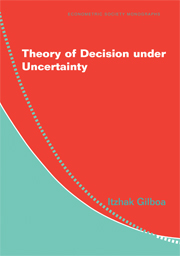Book contents
- Frontmatter
- Contents
- Preface
- I Intuitive Definitions
- II Behavioral Definitions
- 6 A Case Study
- 7 The Role of Theories
- 8 Von Neumann–Morgenstern's Theorem
- 9 De Finetti's Theorem
- 10 Savage's Theorem
- 11 The Definition of States
- 12 A Critique of Savage
- 13 Objectivity and Rationality
- 14 Anscombe–Aumann's Theorem
- III Alternative Behavioral Theories
- IV Cognitive Origins
- References
- Index
- Titles in the series
7 - The Role of Theories
Published online by Cambridge University Press: 05 January 2013
- Frontmatter
- Contents
- Preface
- I Intuitive Definitions
- II Behavioral Definitions
- 6 A Case Study
- 7 The Role of Theories
- 8 Von Neumann–Morgenstern's Theorem
- 9 De Finetti's Theorem
- 10 Savage's Theorem
- 11 The Definition of States
- 12 A Critique of Savage
- 13 Objectivity and Rationality
- 14 Anscombe–Aumann's Theorem
- III Alternative Behavioral Theories
- IV Cognitive Origins
- References
- Index
- Titles in the series
Summary
THEORIES ARE ALWAYS WRONG
In the heat of the debate regarding the uniqueness of the utility function we may have failed to highlight some observations regarding the way we think about theories. We have to discuss it at some point, and this seems as good as any.
Transitivity of preferences implies transitivity of indifference, and we convinced ourselves that this is a highly idealized assumption. We even concluded that transitivity is the main culprit in obtaining the wrong conclusion that the utility function is only ordinal. At the same time, we argued that it might be a “legitimate” assumption. How can an assumption that is violated by all people almost all the time be legitimate? What is meant by a “legitimate” or “reasonable” assumption?
Let us consider an example. Suppose that A and B debate the issue of globalization, as in Section 6.3.4. A mentions the welfare theorems, and B counters that they rely on the assumption of transitive indifference, which is totally and absolutely false. What would you say?
You may wonder whether competitive equilibria exist and whether they are optimal when weak orders are replaced by semiorders. But you may also feel that the argument is besides the point. We are mature enough to understand that our theories are not perfect descriptions of reality and that they are simplifications, abstractions, illustrations, caricatures, metaphors, or any other term that you may use to downplay the theorist's aspirations.
- Type
- Chapter
- Information
- Theory of Decision under Uncertainty , pp. 72 - 77Publisher: Cambridge University PressPrint publication year: 2009



